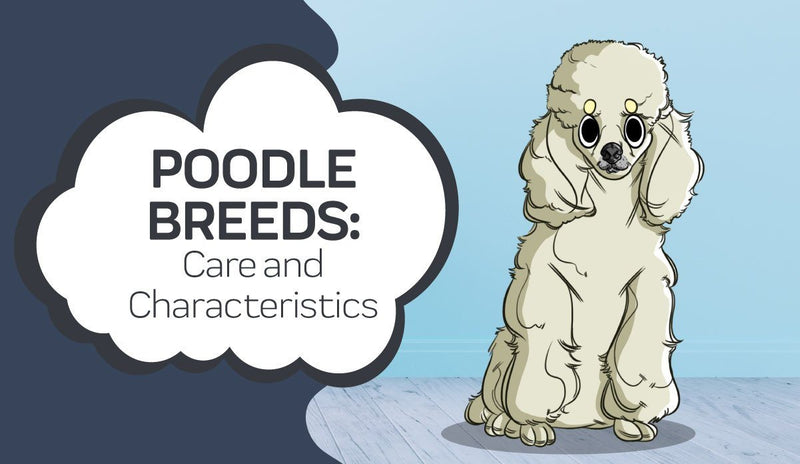
Adopting a puppy is one of the most exciting adventures you will ever experiences, no matter how old you are. How could you not be jazzed about the idea of inviting a puppy into your family? Dogs are man’s best friend, after all. Some people argue that you should choose a purebred dog over a mixed breed dog, while opponents for this opinion advocate for mixed breed canines. Let’s do some myth-busting and talk about why there is no right answer, and as a result, there is no wrong answer either.
What is a Mixed Breed Dog?
Mixed breed dogs are so commonly referred to as mutts. This widely regarded nickname has caused mixed breed dogs to carry around a not-so-attractive connotation. In the media, mixed breed dogs are not depicted in an appealing way. Just think about the word mutt on its own. That is the furthest thing from endearing, but don’t let that deter you from considering a mixed breed dog. There are far more benefits to mixed breed dogs than meet the eye.
Here is a list of some of the top mixed breed dogs in alphabetical order…
- Chihuahua + Pug = Chug
- Corgi + Toy Poodle = Corgipoo
- Doberman Pinscher + Beagle = Beagleman
- English Bulldog + Pug = Bullpug
- German Shepherd + Chow Chow = Shepherd Chow
- German Shepherd + Husky = German Husky
- German Shepherd + Shar-pei = German Sherpei
- Husky + Chow Chow = Chusky
- Husky + Corgi = Horgi
- Husky + Labrador = Labsky
- Husky + Australian Shepherd = Aussie Husky
- Husky + Pitbull = Pitsky
- Shar-pei + Cocker Spaniel = Cocker-Pei
- Labrador + Poodle = Labradoodle
- Maltese + Poodle = Maltipoo
- Miniature Poodle + Yorkshire Terrier = Yorkipoo
- Pekingese + Poodle = Peekapoo
- Pomeranian + Husky = Pomsky
- Poodle + Schnauzer = Schnoodle
- Pug + Beagle = Puggle
- Siberian Husky + Golden Retriever = Goberian
- Shih Tzu + Corgi = Shorgi
What Makes a Dog a Purebred?
Purebreds are also called pedigree dogs, which is very easy to understand if you know what pedigrees are. To summarize, pedigrees refer to diagrams that depict the ancestors of a certain dog. Pedigrees can go as far back in familial history as you want them to, with the eldest family member at the top of the chart and all of his or her descendants appearing lower down on the chart.
Depending on which generation each dog falls into, the younger members of the family will decrease in age the lower down you move in a pedigree. So, when it comes to determining the familial ancestry of a dog, the puppy that you are focusing on will more likely than not be located at the very bottom of the pedigree.
Long story short, pedigrees are the exact same thing as family trees. When the context of a pedigree is dogs, you are speaking in terms of ancestors, and pedigree dogs are named as such because they descend from dogs of the same breed. There is no genetic diversity among purebred dogs.
The most prized purebred breeds are referred to as designer dogs, like the Louis Vuitton or Balenciaga of canines, if you will.
Some of the most sought-after designer dogs include…
- Australian Terrier + Poodle = Terripoo
- Border Collie + Labrador Retriever = Borador
- Chihuahua + Yorkshire Terrier = Chorkie
- Chihuahua + Dachshund = Chiweenie
- Cocker Spaniel + Poodle = Cockapoo
- Dachshund + Poodle = Doxiepoo
- English Sheepdog + Poodle = Sheepadoodle
- French Bulldog + Pug = Frenchie Pug
- Pug + Beagle = Puggle
- Pug + Poodle = Pugapoo
- Labrador Retriever + Poodle = Labradoodle
- Miniature Schnauzer + Poodle = Schnoodle
- Miniature Poodle + Golden Retriever = Miniature Goldendoodle
- Maltese + Shih Tzu = Mal-Shi
- Pomeranian + Husky = Pomsky
- Pomeranian + Toy Poodle = Pomapoo
Purebred vs Hybrid Dogs: Are Mutts Healthier?

Something to keep an eye on is the breeder from whom you are purchasing your dog. The puppy breeding industry can become very shady very quickly, and not all breeders are reputable, let alone ethical. Please be sure that you are doing your research and fact-checking everything you come across. While adoption is definitely the right option, considering the high rates of dogs in canine foster care, we understand that some people will go through a breeder rather than to their local shelter.
That is a personal decision, which you have every right to make. However, we just want to emphasize the importance of being cautious about breeders. Not only would it be unfortunate to go through a breeder who was not honest about his or her breeding process, but it would also be quite the bummer to financially support a breeder who does not treat the dogs very well.
Once you’ve ensured that the breeder is professional and ethical in his or her practices, then you are encouraged to move forward with everything. There are so many mixed breed dogs out there, and unless you know exactly which breed you want as a pet, you could very easily become overwhelmed by the seemingly endless number of mixed breed dogs in the world.
In theory, it would really help if we were to talk about specific dog breeds in terms of health, just for the sake of narrowing down some of the best-mixed breed dogs available. But that is nearly impossible to do, in all honesty. A question that is likely on many people’s minds is if mutts are healthier than purebred dogs. The truth of the matter is that there is no finite answer to this question. Similar to what we mentioned when discussing the costs of purebreds versus mixed breed dogs, everything should be looked at from a case-by-case basis.
Some mutts are healthier than some purebreds, whereas some purebred canines are healthier than certain mixed breed pups. It is entirely situational. There are instances where many similarities are found among certain dog breeds, but the reality is that you cannot say with absolute certainty that one category of dogs is superior, in terms of health, than the other.
There's a widespread misconception that purebred dogs are inherently less healthy than mixed breed dogs. Inbreeding leads to a greater chance of the development of genetic diseases. This belief is founded on the basic principle that purebreds are more prone to genetic predispositions to certain ailments and diseases.
There isn't any genetic variety among purebred dogs, which is the literal definition of purebred canines. As a result, any complications that a breed faces just by nature will be repeated from one generation to the next, due to the fact that there is no genetic variation among the dogs of the same breed.
With mixed breeds, the thought process is that they are more capable of fighting diseases that come their way because their hybrid nature offers a higher possibility of defending themselves against invading illnesses. These claims do make sense, but the idea that purebreds are always less healthy than mixed breed dogs is not necessarily true.
So, are mutts healthier than purebred dogs? Sometimes.
Are mixed breeds healthier? Not always.
Mutts are healthier than purebreds if genetic diseases are continuously passed down from one generation of purebreds to another. Purebreds are healthier than mutts if the purebreds won the genetic lottery, and mutts are healthier if there is compatibility between the various breeds of the mixed breed dogs.
Purebred vs Mixed Breed Life Expectancy Rates
The trend that we are seeing here is that there isn't a one-size-fits-all answer to any question that compares mixed breed dogs to purebreds. You see, life expectancy is much the same. There are multiple factors that play a role in the lifespan of a dog, whether purebred or mixed breed.
These variables include...
- Height and weight of the dog
- Whether or not the dog was spayed
- Whether or not the dog was neutered
- How well the dog was cared for
That said, there is definitely a decent amount of data that shows inbreeding as reducing the lifespan of dogs. As we've mentioned briefly, there is a heightened risk of diseases and illnesses when inbreeding is involved because there is no genetic variation. So, unlike mixed breed dogs, purebreds are more likely to run into health problems somewhere down the road. Purebred dogs do have a shorter lifespan than their mixed breed counterparts.
How to Decide if You Should Adopt a Purebred or a Mixed Breed
Everything we have touched on so far in this blog post should be used as information to help you decide between a purebred or a mixed breed. There isn’t just one characteristic to take into consideration. The decision process is far more complex than that.
Another one of the major determining factors involved in the thought process behind getting a dog is the cost. The dollar amount associated with a certain dog tends to make or break your decision. A common belief among the general public is that purebred dogs are far more expensive than mixed breed dogs. But is this true across the board?
Well, not necessarily. Not all purebreds cost more than mixed breeds, and not all mixed breed canines have a higher price associated with them than purebred pups. Although purebreds tend to be more expensive than mixed breeds, the cost of buying a dog depends more on the breed of the dog than whether or not the dog is purebred or a mixed breed dog.
That can sound confusing at first glance, so let’s break it down briefly. The dog breed is more important than the purity of the dog. If you have a purebred dog of a breed that is very rare, the purebred will cost more. If you have a mixed breed dog that has a genetic makeup that is hard to find, then that particular mutt is going to be far more expensive than a purebred that can be found in abundance.
As a disclaimer, we want to mention that many breeders will charge more for purebred dogs than for mixed breeds, or mutts. This is a way of capitalizing on people’s conviction that purebred dogs are worth more than mixed breeds, and in some instances, this is true. If it’s important to you that your dog is a purebred, then paying more will be worthwhile. However, purebreds are not pricey because they are purebreds. They are pricey because people believe that they are worth more, so breeders can get away with charging more for purebreds than for mixed breeds.
Let's look at some of the most costly breeds of dogs, and then we'll continue talking about the common discrepancies in price between purebred dogs and those of mixed breeds.
Less expensive dogs include…
- American Hairless Terrier
- Australian Shepherd
- Australian Terrier
- Beagle
- Bichon Frise
- Border Collie
- Boykin Spaniel
- Cane Corso
- Chihuahuas
- Chinese Crested Hairless
- Coonhounds
- Dachshund
- English Bulldog
- English Foxhounds
- Foxhound
- Harriers
- Jack Russell Terrier
- Manchester Terrier
- Mexican Hairless Dog
- Miniature Pinschers
- Miniature Schnauzer
- Puggle
- Rat Terrier
- Setters
- Yorkie
More expensive dogs include…
- Afghan Hounds
- Akita
- American Bully Dog
- Azawakh
- Bedlington Terrier
- Cavalier King Charles Spaniel
- Chow Chows
- Czechoslovakian Wolfdog
- Dogo Argentinos
- English Bulldog
- French Bulldog, or Frenchie
- Irish Wolfhound
- Lakeland Terrier
- Lowchens
- Orchid Azawakh
- Peruvian Inca
- Pharaoh Hound
- Portuguese Water Dog
- Rottweiler
- Saluki
- Samoyed
- Tibetan Mastiff
- Canadian Eskimo Dog
Of course, making the initial purchase and buying a dog to welcome into your family is a big step. But something that many first-time dog owners neglect to recognize is that the initial price you pay to own a dog is usually a pretty accurate reflection of the level of investment you are taking on by getting a dog. When it comes to costly dog breeds, you are not just paying a large fee upfront and then settling into an affordable range of costs associated with your new canine friend.
Expensive dog breeds are often high-costing for the entire duration of their doggy lives. You have to take into consideration all the various costs associated with your dog, from grooming and training to specific diet-friendly foods and visits to the veterinarian’s office. The type of dog fees that rack up the highest bills is vet appointments, both those that are scheduled and those that are emergency-related.
CBD for Mixed Breeds and Purebreds
The decision of whether to bring home a purebred pup or a mixed breed doggy is ultimately entirely yours. We’ve provided a decent amount of information documenting the differences between the two, as well as the similarities. There are so many differences that set purebred dogs and mixed breed canines apart. From initial costs and preparing to give your dog the best life, to lifelong expenses and everything in between, purebreds and mixed breed dogs each come with their own obstacles and advantages.
When thinking about investing in a puppy, you should buckle in for the longest thought process of your life. There’s a lot to take into account, as well as a plethora of options to weigh before making your final decision. Deciding on a dog is the hard part. The easy part? Knowing how to treat your dog, should he or she ever come down with chronic pain, immobility, unwanted illnesses, or anything of the like.
When it comes to canines, there is a universal way of managing ailments that you can always count on in times of desperation. After all, one of the most terrifying experiences as a dog parent is the moment you realize your canine companion is feeling under the weather. From the occasional bloating and waves of nausea, to anxiety disorders and discomfort that doesn’t go away, CBD for canines can be your secret weapon.
Cannabidiol offers an impressive array of health benefits to dogs of all breeds, shapes, sizes, and genetic compositions. If you elect to adopt a purebred dog, rest assured that CBD oil may help in managing nearly every physical symptom and reduce the intensity of any anxiety-related mental condition. If you bring home a mixed breed puppy who has separation anxiety, CBD may be your answer. Believe it or not, cannabidiol makes just about every unfortunate health circumstance far more bearable.
In the process of preparing for adoption day, consider stocking up on CBD oil for dogs. Even if you do not have an immediate need for canine cannabidiol, it’s always better to be prepared for anything like a dog owner than it is to let surprises come out of nowhere and throw you off course. Thankfully, Innovet has CBD for dogs stocked all year long!

CBD oils are the most common form of CBD for dogs, but you don’t have to rule out CBD if oils aren’t well-suited for your dogs. From CBD doggy treats to soft chews and capsules, Innovet has CBD oil for dogs with all sorts of preferences. If you think your fluffy friend would handle lotion far better than oil, then you’re in luck, because we have CBD creams, too! If you have any questions in particular about cannabidiol for dogs, feel free to reach out to us with all of your inquiries and concerns. You are also more than welcome to look through our blog posts and learn more about CBD for dogs. Trust us when we say your dog will thank you!
Sources:
Mixed or Purebred Puppy: Which is Better?Prevalence of inherited disorders among mixed-breed and purebred dogs
Owner perceived differences between mixed-breed and purebred dogs

Thanks for stopping by!
P.S. We Love You!
Sincerely,
The Innovet Team
Please do not ask for emergency or specific medical questions about your pets in the comments. Innovet Pet Products is unable to provide you with specific medical advice or counseling. A detailed physical exam, patient history, and an established veterinarian are required to provide specific medical advice. If you are worried that your pet requires emergency attention or if you have specific medical questions related to your pet’s current or chronic health conditions, please contact or visit your local/preferred veterinarian, an animal-specific poison control hotline, or your local emergency veterinary care center.
Please share your experiences and stories, your opinions and feedback about this blog, or what you've learned that you'd like to share with others.
















